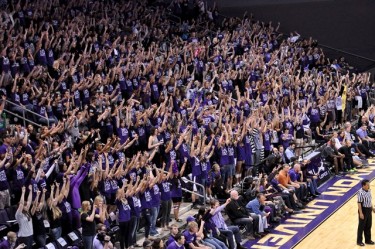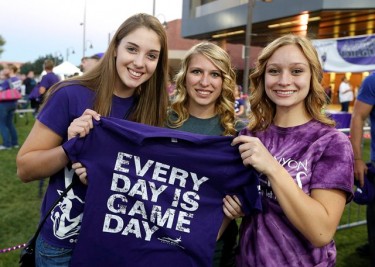Fourth of a five-part series
Story by Rick Vacek
Photos by Darryl Webb
GCU News Bureau
Moving up to NCAA Division I sent Grand Canyon University and its fellow transitioners into a new M.O. – Marketing Overdrive.
But creating a catchy slogan like Lopes Up and rallying students is the easy part. The real challenge is getting nonstudents to come to games and keep them coming back, especially if many of them barely knew that the university’s athletics program existed before it started waving its collective hands trying to get attention.
The attention deficit is exacerbated at five of the six transitioning institutions because they are in or near cities that have professional teams and/or are in the same region with bigger colleges that have more established programs. Only Abilene Christian University doesn’t have competition in the immediate area, but the Dallas Cowboys are so dominant in Texas, they might as well be playing next door.
The formula seems pretty obvious: Get the students excited about D-I. Use their energy and enthusiasm to get the surrounding community on board. Make the game experience as good as possible. Promote, promote, promote. Make it affordable and family friendly. Finally, create an aura that will keep the fans coming back.
Of course, winning can make up for some deficiencies in those areas, and GCU’s successful first year gives officials hope that their program can avoid some of the usual growing pains. But the Transition Six have to assume that they’re not going to win consistently, at least early on.
“Our biggest benefit was that a lot of attention and planning went into the game experience for spectators,” said Keith Baker, GCU’s director of athletics. “Even when we lost games, people enjoyed the experience.”
Brian Mueller, GCU's president and CEO, emphasized the community involvement and GCU's place in it.
"I think that with the community feeling this can be a rallying point for the city of Phoenix and the west side," he said. "We want to provide very high-quality, very exciting, low-cost family entertainment. This is a place they can bring the entire family and be around college students who are good role models.
"We also want to continue to use our athletic programs to promote the core initiatives that we started last year, such as Dream Center and HopeFest Phoenix. We want it to be a victory for the community."
GCU’s success in turning its arena into a home-court advantage – which should be even more pronounced in the 2014-15 season with the new upper deck – should not be taken lightly. This isn’t happening elsewhere among the Transition Six for basketball, not like this. Only Northern Kentucky University draws as many as 3,000 for men’s basketball; the others are around 1,500 down to as few as 450.
However, two of the six – University of Nebraska Omaha and University of Massachusetts Lowell – have dominant hockey programs that get more attention and draw well, and Abilene is more focused on getting people to come to football games. Mark Papich, director of athletics at University of the Incarnate Word, said his institution has decided that, like GCU, men's basketball will be its primary focus, but it's primarily a commuter campus and draws only 500 except for an occasional spike to 1,200.
When a new basketball team in D-I starts to be able to consistently draw more than 5,000, as GCU plans to do next season, it’s notable. Trouble is, that doesn’t always translate into as much coverage in the media as the university might like, especially at a time when most media outlets are cutting staff and resources, not adding.
“It can be a challenge,” said Dave Ahlers, director of athletic media relations at Nebraska Omaha. “There are only so many minutes in the sportscast and so many inches in the sports page.”
UNO adopted an interesting slogan when it went D-I: “Omaha’s Team.” Trev Alberts, the university’s director of athletics, proclaimed it at the 2011 news conference announcing the move to D-I, and the school decided to run with it even though Creighton University and its highly prominent men’s basketball program is nearby and University of Nebraska Cornhuskers football gets coverage that Thad Livingston, sports editor of the Omaha World-Herald, likens to what the Cowboys get in Texas.
“It’s been well-received by the community,” said Josh White, Nebraska Omaha’s senior associate athletic director. “We’re trying to put ‘Omaha’ on all of our jerseys. It makes sense, because we get drowned out if we put ‘UNO’ or 'Nebraska Omaha' on them.”
A little humor doesn’t hurt. When UMass Lowell went D-I, one of its videos had the university’s mascot, Rowdy the River Hawk, go around campus and look for places to change “2” into a “1.” (You can view the video here.)
UMass Lowell also used the move to D-I to change its slogan, from “Soaring with Pride” to “Soaring Higher.”
“Our mission was to aggressively overcome the Division II reputation,” said Dana Skinner, Lowell's director of athletics. “This is a very crowded media market, and carving out attention is very difficult.”
One way to get people to come to games is to schedule big-name programs to come to your place. “You have to find things to promote,” Skinner said, “and sometimes it’s the opponent.”
But then, good luck getting a major university to do a home-and-home. They’re more than happy to bring in the transitioner for what often is a good spanking, but they’re not keen on the idea of a trip to the newbie’s arena because the gate at the smaller institution’s venue doesn’t figure to be nearly as lucrative. And, of course, there's a greater chance of an upset.
“You have to establish yourself before you can even get some of the mid-majors to come to your campus,” Abilene Christian's director of athletics, Jared Mosley, said.
Alberts told GCU Today in an interview last year: “Whether it’s your first year or seventh year, scheduling is always a challenge. Getting teams to come play you at your home venue outside of conference play is difficult. Schools with a larger brand don’t have a lot of incentive to come to your place.”
During the 2013-14 men’s basketball season, the Transition Six played these opponents of solid reputation:
- GCU: Utah, Tulsa, New Mexico
- UMass Lowell: Michigan, Cincinnati
- Northern Kentucky: Purdue, Kentucky, North Carolina
- Abilene Christian: Maryland, Iowa, Xavier
- Nebraska Omaha: Iowa, UNLV, Minnesota
- Incarnate Word: none
And how many of those were home games for the six? Zero. Not a one. The only home “game” that anyone got was Northern Kentucky’s exhibition against the University of Louisville, which drew 8,800 to its 9,400-seat Bank of Kentucky Center.
Some of those trips can be recruiting tools – “Hey, come here and you’ll get to play at (fill in team here).” Alberts said Texas Tech University officials were so eager to have UNO come down to Lubbock a couple of years ago, they flew the team there in a private jet. “I hope they didn’t get too spoiled,” Alberts said of his team.
GCU will start to reap the benefits of its newly expanded arena when the University of New Mexico and Harvard University come here in December. Setting up home-and-home commitments -- one game at your place, a return game at ours -- with big-name opponents no doubt will be the focus of future scheduling. But for now, the Antelopes have to travel to take on the big boys, such as their trips next season to the University of Kentucky, runner-up in the NCAA Tournament in April, and Indiana University. They also are scheduled to play at Central Michigan University, the alma mater of Coach Dan Majerle.
The GCU women’s team has scored a big-time visitor next season: Louisville, which lost to the University of Connecticut in the NCAA championship game in 2013 and reached the Elite Eight this year, will make a stop at GCU on a trip west.
It’s a balancing act, a classic game of that’s good/that’s bad.
We’ll get a shot at the teams the television networks have loved for years!
That’s good!
Well, no, that’s bad. We don’t want to sacrifice our players to a slaughter.
OK, that’s bad.
No, it’s good! We have confidence in our athletes, and we’ve got to capitalize on the newly created excitement on campus!
You’re right. That’s good.
Uh, it could get bad. We don’t want to watch that enthusiasm die a slow death as the losses mount up.
That’s bad.
No, it’s still good! We get to make some really cool trips and we’ll be on TV! And we’re not expected to win those games. What if we were to actually win or at least give them a good scare?
And so on. There are no easy answers. You want some tough games and some you think you can handle. The coaches are the ones who put together their schedules, with input from the athletics administration.
“They’re based on relationships,” Baker said, “but there’s a lot of strategy.”
It's a strategy that is as much designed to avoid losing – and losing big – as it is focused on winning. Baker probably spoke for a number of people throughout the Transition Six when he said, “That’s always the fear – that you’re going to get killed.”
And that’s not good for the coaches or athletes … or the marketing campaign.
ALSO IN GCU TODAY: The University of Massachusetts Lowell faces many of the same issues as GCU – but also is growing quickly.
ABOUT THIS SERIES:
Part 1: GCU came up a winner in Year 1 of D-I. Sidebar: Nebraska Omaha.
Part 2: How three veteran coaches approached and managed the first year. Sidebar: University of the Incarnate Word.
Part 3: Antelope athletes talk about what it took to move up to D-I from D-II. Sidebar: Abilene Christian University.
Part 4: GCU isn't the only university trying to establish itself in a competitive sports market. Sidebar: University of Massachusetts Lowell.
Part 5: Changes and challenges often mark the second year of the D-I transition. Sidebar: Northern Kentucky University.
Contact Rick Vacek at 602.639.8203 or [email protected].





































































